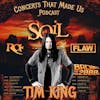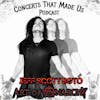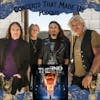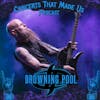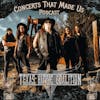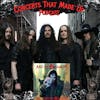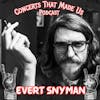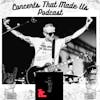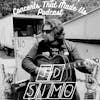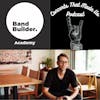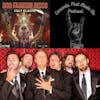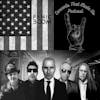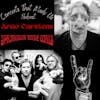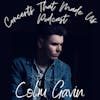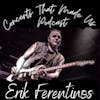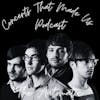Joy Pereira: The most memorable moments of a 20-year career at Sydney Opera House
On this episode Brian is joined by Joy Pereira.
Have you ever been to a concert or a show and wondered about all the behind-the-scenes work that goes into making it happen? In this episode, we get an exclusive look at the life of a stage manager from Joy, who worked at the Sydney Opera House for 20 years.
Joy shares her earliest musical memory of listening to Barry Manilow in the back of a Volvo, and how that sparked her interest in the entertainment industry. She talks about her role as a stage manager and the variety of shows and events she worked on, ranging from big rock gigs to plays and corporate events.
One interesting topic they discuss is the gig culture in Sydney and whether it's sustainable for bands to make it in Australia or if they need to go overseas. Joy explains that the music scene has changed since the 90s and the lockout laws have had a negative impact on the industry. However, social media has made it easier for bands to get their music out there, but algorithms can also be a hindrance. Joy emphasizes the importance of timing and engagement to get noticed on social media.
Joy also shares some funny stories and talks about dealing with massive egos in the industry. She believes that the best artists are those who are prepared and give their all on stage, and emphasizes the importance of giving both the artist and the audience the best experience possible.
Finally, Joy talks about her decision to start a podcast called "Nerds of Joy" and how she chooses her guests. She explains that she wanted to explore new opportunities for growth and creativity beyond her role as a stage manager. She encourages people to pursue their passions and live their best lives.
Overall, this episode provides a fascinating look at the art of stage management and the entertainment industry. Joy's passion for music and storytelling shines through as she shares her experiences and insights. So next time you're at a show, take a moment to appreciate all the hard work and dedication that goes into making it happen.
Find Joy Pereira here:
https://joypereira.com/
https://www.instagram.com/joypereiracreative/
https://www.youtube.com/channel/UCUwJKvwEeGFBBPBfMX64JnA
https://www.pinterest.ie/joypereiracreative/
Find Nerds of Joy here:
https://open.spotify.com/show/0Ehsz3PxV1nFdlL6jsqe5G?si=38aee7068ed44200
Find CTMU here:
https://linktr.ee/Concertsthatmadeus
Newsletter: https://concertsthatmadeus.aweb.page/p/f065707b-2e34-4268-8e73-94f12bd2e938
If you would like to support the show you can do so by rating/reviewing us on Itunes and Spotify or by signing up at https://www.patreon.com/Concertsthatmadeus
Save 10% on Band Builder Academy membership by following this link https://bandbuilderacademy.com/Brian_Concerts/join and using promo code "concerts" at signup.
Become a member at https://plus.acast.com/s/concerts-that-made-us.
Hosted on Acast. See acast.com/privacy for more information.
Brian (00:00:00) - Joy, you're very welcome to the show.
Joy (00:00:03) - Thank you very much for having me, Brian.
Brian (00:00:05) - I'm actually delighted to have you know, this is a side of the industry we don't get to talk to too much on the show now. So I'm excited to hear your stories and see that side of the business.
Joy (00:00:18) - There's a lot behind the scenes or side of stage that people I think might not be aware of. But I think if you're a music lover, then it's really good to explore what goes on and on the other side.
Brian (00:00:30) - Yeah, definitely. Definitely. So you've been the stage manager of Sydney Opera House for 20 years. But before we get into that, we'll start at the very beginning. Now, if you can, can you remember your very earliest musical memory? Gosh.
Joy (00:00:48) - You know, my parents weren't that musical, but I do remember memories of being in the back of a Volvo and sliding around on the plastic type leather seats. I don't think they were leather plastic and getting a pencil and like rewinding the tape to a song.
Joy (00:01:06) - I think it could have been Barry Manilow. That's maybe what they were into. We were listening to it, but rewinding that tape and everyone had to take a turn to rewind the tape.
Brian (00:01:16) - Right. Right. It's that just reminded me of that meme that you often see on Facebook now with the pencil and tape. And it's like you're old if you know what this is. Oh, God, I'm not calling you all. Of course now.
Joy (00:01:29) - And that's okay.
Brian (00:01:30) - At what point, then did you realize that you wanted to work in the entertainment slash music industry?
Joy (00:01:38) - Well, I think I was always a kid that was really into film and TV, and I was really fascinated with how that kind of was all put together. And I was actually quite shy and your kid at school, but there was always this kind of like show quality that I was really interested in, and it was probably coming from like Looney Tunes and all of those kind of shows that you'd see, like The Barber of Seville and you'd see Bugs Bunny doing his thing.
Joy (00:02:02) - And I think it stemmed from that. I just really loved the different aspects of music. And, you know, I played the piano, I was going to piano lessons. So that was probably the only musical education as much that I had as a kid. And it was certainly the only extracurricular thing that I did as well. But by no means am I a virtuoso on the piano or anything.
Brian (00:02:28) - And did you ever, you know, consider going into the performance side of it?
Joy (00:02:33) - I did, actually. That's probably where I first got my start. Meaning that I, although shy at school, didn't really especially primary school. Very, very shy little one. I had this sort of thing where I'd come alive, when I'd have to do like little skits or little performances within the classroom. And I think it was probably getting towards year ten, which like, you know, we go up to year 12 here in Australia, and I suddenly went, I kind of want to act not to be famous.
Joy (00:03:06) - And it wasn't, you know, it's not saturated like it is these days where everyone gets on a phone and they do their thing and lots of people want to be famous. It was just purely, I think, like it was a craft as well. And so I used to do drama on a Saturday outside of school, and then we'd be cast in like as extras and things on Home and Away, if you know that show, if that's made it to. Yeah. So like you'd be in the background banging the lockers and, and all of that. And I just had this real interest by doing that to see how there were so many other roles. It wasn't just acting, but there was also all of the technical people, the directors, the cameras, everything. So it was all fascinating to me and that was probably a really good kickstart before I finished school or such.
Brian (00:03:51) - Yeah, yeah. It's actually funny you mentioned Home and Away because over in Ireland that's like when anybody thinks of Australia, they think of Home and Away.
Brian (00:04:00) - It's been on TV over here, I'd say, for as long as it's been on in Australia. And I knew you were from Australia. And in the back of my head I was like, Don't mention home and away, don't mention home. In a way.
Joy (00:04:13) - I'm open to it. No, it's changed. It's very much changed over the years. I haven't watched an episode for many, many, but in the early days, that's what everyone watched, you know?
Brian (00:04:23) - Yeah. Yeah, I still remember, um. Remember Shane and Angel in it years ago? Yeah. That's when I used to watch it.
Joy (00:04:33) - Got you. And I used to actually do acting classes with Shane. Really? With the actor before he got the role. And then. Yeah, very sad story about him as well. Dieter Brummer. But really fun. Lovely, lovely guy. So yeah, I did watch it in those times and rip for him.
Brian (00:04:53) - Yeah, yeah, exactly. Exactly. And you know, how did you get into working at Sydney Opera House and how did you become the stage manager?
Joy (00:05:04) - Well, it was very interesting because it was.
Joy (00:05:06) - It was always film and television or it was going to be theater. And I didn't know which one. And I decided to apply to different universities before school finished and had to audition and whatnot, and then decided very quickly that I wanted to go to this particular uni because it was by the beach and it was close to Sydney and all of those sort of things. So I didn't have to go out into the Wild West and, and study film and television, which I didn't know if I regret it or not. I still love that. But then that was the degree. It was a Bachelor of Creative Arts in theater. And then, you know, you do an acting as well in the first year and then you could specialise in different things. And then there was also the screen production component. So yeah, it was it was completely up my alley. It was everything that I wanted to do and by the sea so I could learn to surf.
Brian (00:05:57) - Lovely, lovely. And it's one of them jobs that, you know, obviously we know there's a stage manager there, but the normal person going to a gig or a show doesn't exactly know what the stage manager does.
Brian (00:06:11) - So what was your day to day like?
Joy (00:06:13) - I love this question. And Brian, it is because if you're doing a bad job, you're going to know who the stage manager is. If you're doing a good job, it's seamless and you're barely seen day to day. Are you talking specifics for the Opera House? Mm Yeah, yeah. We we had so many shows coming in, so many different shows. So you get the big gigs with all the big famous artists from all around the world. There'd be like plays and different things. There might be some media events going on, there could be launches, it could be corporate stuff. So it was such a mixed bag of different things. And so essentially there was a pool of us that got rostered on specific things, kind of based on our experience in a way. And just the ability to call shows. Some of the shows required you to follow a score and call off a score. Then there were the big rock gigs, which I really loved.
Joy (00:07:08) - That was just kind of my thing. Like more more so than anything, I think I always gravitated to want to do that and just with experience and things like I got rostered on some really cool things, but I mean a lot of the pre-production was done, so it was kind of like stepping in and then knowing what the riders were for the actual gig, that sort of thing, and then executing it, making sure that things were happening to time and all of that sort of being in the interface with side of stage and the actual crew as well as like the visiting artist and all of the people that are associated with it, you know, the, the companies and various things. So yeah.
Brian (00:07:47) - Yeah, yeah. And when you look back over your whole career, what are the high points? You know, what are the memories you kind of enjoy reliving?
Joy (00:07:59) - I think, you know, you can there are so many different stories I could tell you. But what I really loved was just that thing of us getting something up, you know, like to actually have it the curtain go up or the lights to go down at 8:00.
Joy (00:08:14) - Like that was the intention. That's what needed to happen. And I love just driving the stage, meaning not being a stage driver with a whip and getting people to do. But it's that healthy respect of knowing that each person or each role has something very critical and they're good at what they do. So it's kind of like facilitating that to make sure that they're okay and that they're aware with it. If their heads down, like doing a lighting plot or, you know, mucking around with sound and things like that and something's really quite difficult or a soundcheck is difficult, making sure that all the, you know, parameters are jumped so that everything goes along smoothly. People get breaks, people the show is crafted. In some instances you would have to really shape the show and build cues and do things like that. In other instances, it was kind of like a venue for hire. So a company might come in and they've got it all sort of sorted out as well. So it was just more a case of being there for them in case things go wrong, in case you needed to evacuate all of those kind of glorious things.
Brian (00:09:18) - Yeah, yeah. Something just popped into my mind. You know, I. I often ask my guests what is their local music scene like? But I mean, from a a point of view as what's the gig culture like? You know, from the audience's point of view is there are lots of festivals. Is it more so just, you know, the gig with the one band coming into Sydney? What what is it like?
Joy (00:09:42) - You know, I could because I told you. I told you about my pencil that I used to rewind the tapes in. I'm definitely a girl of the 90s and things, and in those days, life was so much different, you know? You weren't you didn't have the mega festivals going on, so you would go and see your band. If you'd like to band, you'd go and see it. If your friend liked the band, you go in to see it. There was a big culture of doing that. And then in Sydney, of course, we before the pandemic, we kind of had lockout laws, which really did kill a lot of the music scene, and that was off the back of a one punch scenario where a young guy died.
Joy (00:10:20) - And there was just through through that, there was a lot of lockdowns. The situation changed. Like we used to have little pubs, I guess like in London. I don't know what islands like where you'd have bands playing and there were like terraces and things all around and that was a okay. That was the culture the bands played, you know, Friday, Saturday nights, definitely, maybe midweek, and no one worried about it. It was all good. You chose to buy or rent or live next to a pub that was good. But now there's just that culture of, you know, people calling up. They have problems with noise, all of that kind of stuff. So a lot of places have closed down. And that was my concern of like, how do young bands cut their teeth? You know, where are they actually getting that stage experience where they're building a gig or building a following or enjoying just everything that comes with actually doing a live performance. And so, you know, we had the big day out, which is also closed as well.
Joy (00:11:17) - But that was a wonderful thing. There was another one called Home Back was was all Australian music and it was the big lineups of the international band as well as locals. So we did have that for a very long time and I think it just started to wind down. Perhaps people weren't wanting the big experience. I think people have changed where there's a lot of algorithms choosing their music via Spotify and they suggest more of the same. And you know, I don't I think the last big gig I went to was Splendour in the Grass, which is a big festival we have in northern New South Wales. And we, you know, I was taking the kids by then, so you know, it definitely building up the culture of the kids to know that it's music is really important. It's something to do as well. And they're coming back as well now that Covid is still here. But, you know, the the laws have changed. So there's different things that are that are happening. But I don't see the culture of going to bands anymore as such, you know, with where you've got the drummer and the guitarist and you know, the keys and the singers and and things like that.
Joy (00:12:30) - It does still happen, but it's not, it's not how it used to be.
Brian (00:12:35) - Yeah, yeah. You might have some insights into this side, but then, you know, over here it's like when a band gets together and they start getting a bit of a following in Ireland anyway, it's like they can only get so far and they have to go to England or further afield to America. Now Australia is obviously a massive country. Is it sustainable for a band to make it in Australia or do they look to go to the States and Europe as well?
Joy (00:13:04) - I think they've just got to go. To be honest, I mean it. Now we look at now we've got social media, we've got different things which have the ability to, I guess, get someone out there before you might have need the you needed the machine perhaps to do everything to tour, to have all the merch, all of that kind of stuff. Now you can do it. And I love bands that schlep it in one big hiace or one big van, and they go to different places and they organise the gigs and they do their social media and they, you know, build their albums at home essentially because the tech's kind of there these days where you yeah, you don't have to necessarily go into the studio and have session recorders and recording people and and all of that.
Joy (00:13:51) - So it's very different. I think there's definite benefit, but there's also drawbacks as well. And how do you get featured or how do you get seen if the algorithm once again delivers you more of the same?
Brian (00:14:06) - Yeah. Yeah, exactly. Exactly. It can be one of the best things, but also one of the the biggest things to hold your back, you know? And then of course, algorithms don't always go in your favour. I've heard stories of people getting I can't remember the term, but it's like blacklisted on social media for maybe 1 or 2 posts that they didn't get interaction enough interaction on and then like their next posts for a couple of months won't be shown to anyone, you know.
Joy (00:14:33) - Yeah, that's it. It's sometimes it's only stoked, you know, there's definitely a method you need to do to get in there. What's the best time of day If you do post then when do you comment? When do other people comment? Who shares it? It's all of that sort of goodwill stuff that gets you further.
Joy (00:14:49) - But you know, like that's that's a completely different role to essentially being a musician or an artist on stage. So.
Brian (00:14:57) - Exactly, exactly. And back to the Opera House then, you know, I mentioned earlier, it's something that people don't get to see. So what are some things that maybe happen behind the scenes that weren't so great and how did you overcome them?
Joy (00:15:13) - Oh, gosh, there's a lot of different things. Okay. Um. I think that for me, there's always there was always time. You know, it was all very time and structured. So you'd have a production schedule, how it needed to roll out if things didn't go to plan, something was late, maybe an amp, blue, things needed to be replaced. Maybe the band was late or they chose to come in late. There's so many different things that can make things fall over or stretch away, you know? And your role was to sort of pull things back together. I think if you're looking for some juice on difficult times, maybe, Brian, I can give you a funny story.
Joy (00:15:57) - It was I was quite early in the piece when I was there and there was this opera diva and she was doing this show and it was a solo show. I think she had an orchestra, I can't really quite remember, but she was so angry and so, so just dismissive of everyone that came into her way. And I think she took not a liking to me, but because I was female, she kind of was like, I'm going to see her. And my role is not during the interval to go downstairs and pour her a cup of coffee or something like that, but she didn't want anyone else. So like, you know, the management would gently massaging joy, Would you mind doing this? And Darren I'm like, I've got different things. We've got calls to do, blah, blah, blah. So I said, okay. I agreed. I'll go downstairs to her dressing room. I'll get her a cup of hot water, which is all she wanted. Could have been anyone to give it to her, but it had to be joy.
Joy (00:16:52) - And I gave it to her and I'd probably like left it shy of about a, I don't know, an inch or two just so she wouldn't burn herself or scald her mouth because you know what would have happened then? And I remember walking in, she was like, to the top, to the top. I was so disgusted in the way that she spoke to me. So was like marching back up the corridor to the, you know, the on tap on demand hot water. I filled it right to the top. I'm like, she's going to burn herself. And then I gave it to her. And it was just it was just horrible. She sang. It happened. And at the end of the show, she came to me and she was so sweet. Which just makes you go. People are going through stuff we don't know what. We don't know how she was feeling about the performance. Maybe it was a lot of stress that she was actually at the Opera House. There was a lot riding on it.
Joy (00:17:44) - There was a lot of press, so many things. But how you treat people is everything. And to be a stage manager, how you treat people is everything. I've come across people that are really quite abrupt and domineering and aggressive as stage managers. Bless them, whoever you are, if you're listening and you don't have to be that way, like you can really be kind and generous. You're still direct, you know, you still know what you need to get. But yeah, that was that was a kind of a fun moment in time. It sticks out as a memory because it taught me a lot that you're going to encounter these people and I've got a ton of rock and roll stories, but I don't know where you want to go.
Brian (00:18:23) - Brian Well, it got me thinking about massive egos that you might have to deal with, you know, and we've all heard them stories of the rock and roll band that pulls into the stadium, and they won't go onstage unless they have a ball filled with like 5000 yellow M&Ms and, I don't know, some obscure water from Thailand or something.
Brian (00:18:48) - Have you experienced much like that?
Joy (00:18:51) - Oh, yes, my friends and I think that they do some really silly rider moments because they want to make sure that people are reading every line so you know, that that take out all the blue M&Ms or this specific water or and you know can't even get it access it in Australia but little things like that. I think they want to make sure, you know, that all technically everything's there and there is there there is a lot of I have come across bands who have meant to have sound checks and things and their management and their tech crew are pulling their hair out because they're like, Where are they? They're late. You know, it holes everything up. And I think that for me, the best artists or the best bands are people that know what they have to do. It's like if you're an athlete, you get prepared for the game, you do what you need to do, You are ready and people have paid money to see you, so you want to be have you game face or have, you know, do your very best out there.
Joy (00:19:53) - I have seen bands that could be quite lazy, if you will, because they're just in running through the motions. And it's hard, you know, it's hard to be on the road visiting city after city after city and everything looks the same and you don't actually have enough time to sightsee. And you need those days to recover because you're just exhausted. So I can sort of, you know, I have empathy for people who are a bit rude in a way, but there's definitely that turn of the coin, which is just that ego that can be there. And we're all people. We're all the same. We're all doing the things I think that sometimes I witnessed a bit of rude from potentially the touring party as well because they don't care about the venue people or maybe the venue. People have been horrible in previous life forms or different countries who haven't given them what they wanted. So it's that real assessment. Each time you're in somewhere, just be open, you know, be aware you've got your rider.
Joy (00:20:55) - Hopefully the people know what the what you want and everything's being prepared for it. Hiccups happen, you know, things happen. Just be graceful to be able, you know, because I'd be often in the firing line the first person or the person on demand to resolve those situations or those problems. So that's where the the art of gently tap dancing around the situation to make things work is good. And for me it's always about, you know, did the artist leave with the best experience or did the audience get what they wanted? Were they all happy? Did we go up on time? Was it safe? You know, Did they have absolute fun? Did the artist feel so comfortable that they came on stage and they had the best show ever? You know, Yeah, that's what I want. That's what I've always wanted.
Brian (00:21:43) - Yeah, that's a that's a side of it you don't actually think about either, you know, because you think of going to a concert and it's all about can the artist give the audience the best experience? But then I suppose it's your job and your team's job to give the artist the best experience as well.
Brian (00:22:00) - That's an interesting take on it now.
Joy (00:22:02) - I mean, it's it's it's how it's how you get, I guess, the gold. And I think, you know, for me, I mean, maybe I'm just that type of person I would if someone was just vile and they came into a new venue and things like this is the Opera House, it's a big deal for them. And I wanted them to change maybe their perception of what a venue team is or, you know, what it is to perform or that they would have a good show. Because there's a lot of, you know, I'd seen a lot of the touring party that would be really stressed out based on whether the linchpin the artist was going to freak out or not. And I think that's a really difficult and toxic place to be. If you're touring for months on end and you're living on a knife's edge because someone might lose their sight. Can you say that in Ireland?
Brian (00:22:52) - Can indeed.
Joy (00:22:53) - Um, but yeah, yeah, it's a hard thing.
Joy (00:22:57) - It's not easy. You know, doing any of this stuff is not easy because you might be really good at it, so it comes easy, but it physically takes its toll over time, I think. So you want to try and stay as fresh as you can and work with really good people and hopefully people that are a bit sort of more optimistic. That's that's a good one as well.
Brian (00:23:19) - Yeah. Yeah, definitely. Definitely. And it is called concerts that made us after all. So I have to ask you what concerts dating have made you?
Joy (00:23:30) - Oh, my gosh. This is very hard, Brian, Because I did. I was like, there's so many, so many shows that have made me, um, there's so many shows that have inspired me. Uh, I don't know. Do you want a list of people that I've done shows for?
Brian (00:23:45) - Yeah. Yeah.
Joy (00:23:46) - I'll give you a little list. And then if anything jumps out, you can ask me questions about it because everything has has informed me.
Joy (00:23:54) - And I think that, you know, that's, that's the beauty of being an artist. You affect change in people. You mean so much to people. You people you know might worship you or, you know, if they're extreme, they're fans. They have a deep respect. You might have shaped or mold them. Your music might have helped them during dark times, all of that kind of stuff. So there's a lot invested in being a fan or being a lover of the music, but there's also a lot that I think the artist has to be grateful for, because if you didn't have the audience or the fans, then you probably don't have a lot. But um, you know, Yoko Ono, Bob Dylan, Robert Plant, New Order, Morrissey. Jamiroquai, Coldplay. Keith Urban. I don't know. Henry Rollins. I've written a couple of things. Engelbert Humperdinck was a hilarious, beautiful show on it. And if you if you know him or anything.
Brian (00:24:46) - I do. I do.
Joy (00:24:47) - The man before Elvis, I think he gave Elvis the white jumpsuit. I have to say, it was like being in Vegas like that or it took me right back to those kind of like jumpsuit days of Elvis. And it was amazing, like because it was so foreign to me, but it was like a time capsule. So that was kind of wonderful. I think Cliff Richard I did a show with Cliff Richard and his lighting guy who was old as. The days did the most incredible lighting and it shocked me. It was a different show, like just the manner in which he lit the stage, you know, with all modern gear and stuff. But it was a different style. Once again, the way that he brought up the the changes in lighting and stuff like they're the they're the memorable ones because they are different. Um, but yeah there's, there's been a lot of, of shows a lot of people um, I can't say like there's been shows that I've just been a punter like the Beastie Boys.
Joy (00:25:50) - I was telling you on Sydney Harbour, that was a great show. Um, just out a bit out of control. We were all falling over far back wedges and stuff like that at the end of it. Um. But I know, like like that's the beauty of going to I think I went to Reading Festival in the 90s when I was little and I think I saw Henry Rollins and he was abusing the crowd and just, you know, doing the Henry stuff that he used to do in those days, Black Flag and everything. And then working with him years later and he's like some little guru on a microphone talking his telling his tales and things like that. It was kind of full circle. And then for my kids to actually meet him at one of the festivals as well, and they're like, Yeah, man, whatever. I'm like, This man is a big deal. Like, let's have a photograph with him. I'll take you to the kids club after. And they're like, So they're smiling and things.
Joy (00:26:46) - And Henry was like, Well, at least, you know, you could just get that sensation. I'm like, Oh, Henry loves hugs. Everyone just give him a hug. And so my kids are like hanging on Henry Rollins. And it was very funny.
Brian (00:26:57) - So it's funny when when you mentioned them first, I was like, I'm going to ask about him. I was going to ask like, what was he like? Because he's known for being so grumpy. But I'm glad to hear you say he kind of went full circle.
Joy (00:27:11) - Yeah, I think so. You know, like everyone has. And I think maybe that's when you start out as a band and I can't say I've never had a band. So, you know, you might go, Oh, Joy, how can you speak for bands? I think I can because I've witnessed so much of it. Um, so many people from like really just starting out to the other end where they've been on stage for 50 years, that sort of thing.
Joy (00:27:33) - And yeah, you just, it's just fascinating. Refresh the question for me.
Brian (00:27:39) - Brian No, I was just saying I'm glad to hear that you said Henry Rollins went full circle, you know, from his black flag days back to, you know, as you said, being like a guru on stage, telling his stories.
Joy (00:27:52) - I think it's evolution. You know, like when we want the band or the artist to play the same thing and they release a new album and we're like, oh, but we just want them to play the original, you know, play your old stuff. We don't want any of the new stuff, but I think that's evolution. You have to evolve where you're just born and you're dying.
Brian (00:28:11) - Yeah, exactly, exactly. And so I'm dying to ask is when you go to a gig as a punter, how do you switch off? Are you standing in the crowd going, I do that different. And oh, I can see what they're doing there. Are you just totally shut it out and you're just there as the punter?
Joy (00:28:28) - Like I'll notice it.
Joy (00:28:29) - And you know, I think it's that thing of not being critical with how other people do things. There can be errors. And, you know, I might see if a lights out or something or they could have cued that better or, you know, the band really should have come on at this specific time on this applause or they could have taken another bow or, you know, all of that kind of stuff is there. But I think for me, it's just going and purely being. And I mean, that's maybe the strange female in me. Like I'm more than happy or comfortable to buy one ticket. I don't have to go with people. And in fact, I actually like going to things by myself because I don't get everyone. Oh, what did you think of this? And did like, I go for the performance and. Uh, yeah. I can't remember who who I have seen recently that was just with me, but it's just, um, I can switch off pretty easily because I'm looking at what the artist is doing.
Joy (00:29:29) - I think that's for me, more important now, how they work the stage. If they talk to the audience, what stories are they telling? You know, are they crafting it actually into a show where they introduce all the band members at one point, all of those sort of things, or is it just clunky? They've got a set list and they just do whatever they do which can work as well, you know?
Brian (00:29:49) - Yeah, true, true. And that's a nice segue. Actually. My my next question I was going to ask is I often speak to my guests about how important it is to build a relationship with the audience, you know, and work on their stagecraft. What's your experience with that side of the performance?
Joy (00:30:07) - I think that that's kind of the key. Like, that's what gives you the X factor. If you're into the X Factor or it gives you that synergy with having, you know, your lyrics, your music given to a offered to an audience and for the audience to take it.
Joy (00:30:27) - So if you're well established, like, say, for Bob Dylan, he didn't talk to the audience once, like didn't say hi or Good evening or This is my next song or Thank you very much. Like none of that, he just played and they adored him. So there's that. But then there's also it's lovely when people kind of share their stories. I, you know, I've just come from blah, blah, blah and this happened and, you know, sometimes people have built in jokes or, you know, they say the same thing pretty much every night. If it's a repeat show, it's about it gets the laughs, it gets the engagement of the audience. So it's kind of up to you how you feel. But I think, you know, artists really need listeners, and that is a beautiful thing when you can engage. Like I think for me, I had the privilege of You've got the band on one side on the stage, you've got the audience, a sea of people on the other side.
Joy (00:31:21) - And I was like, right in this very middle side of stage where I could see both. So I could see really closely the band member or the artist performing. But then I could see the faces in the first couple of rows. And, you know, when they're singing back at, at the at the person on stage or they're adoring them or they're smiling or they're happy and they, you know, they've parted with $500 worth of ticket, whatever it may be. But, you know, when you see them in the rain, you know, I'd be on stage. We're doing an outdoor massive gig, and you'd see these punters that were in their little not umbrellas because they wouldn't like to have umbrellas, but they're ponchos drenched like seurat's waiting because the gates had opened and the show wasn't on or even, you know, the band, even the support wasn't on for the next three, four hours. But they're committed and they're up at the rails just waiting. They're, you know, they're the special kind of ones.
Joy (00:32:19) - They're the ones you give the setlist to at the end of the night, you know, because I've put in the hard yards.
Brian (00:32:24) - Yeah, definitely, Definitely. And with so many people working on a production, then what's the backstage culture like?
Joy (00:32:33) - You have to say, like when you say culture, I think. Everyone's respectful. I think for all the artists that I have worked with, I never asked for a photograph. I never chit chatted to them unless they were really chit chatting. You know, if they approached and wanted to have a big talk about stuff, happy to talk. If they were just heading the game, it'd be a greeting. And then off you go. Tell them what they need or, you know, get what they need. Talk to them about specifics of the stage or the show and then leave them alone. So, you know, I think people are very respectful. I think I would sometimes be put in situations where people wanted to me to sign CD's or signed something of them and I just would refuse unless they were open to it and they were relaxed and calm because at the end of the day it's about protection and protecting the artists from any extra silly business.
Joy (00:33:38) - That doesn't need to happen because I always thought, you know, they're the ones that are working the stage. People are here to see them, let them have their peace, let them have their quiet, let them have their calm, and then move on from there. So I think very respectful. Um, in terms of my crew, they always would be respectful and if they weren't quite respectful, then maybe Joy might say something a little bit to them, you know, just to add them up or make them feel better, because there were instances where I'd come in and generally the stage manager might start later in the day, but, you know, the sound or the lighting or the tech crews were there earlier to bump in and do all that kind of stuff. And you'd come in and sometimes the production manager would come up and go, Oh, we're broken and broken because people are horrible and you don't want that. So I'd turn up and then, you know, Joy would be on stage and did do do.
Joy (00:34:34) - And maybe it's the only female that they've seen the whole day. And so, you know, that's that's been an interesting ride as well. Sometimes you would turn up and they'd be like, Oh, who's this woman? Who's this chick? What's it's about? You know? So there was like, until they knew you within about the first five minutes, then they'd be like, Oh, okay, she's cool, it's okay, we can go with that. But all of that silly stuff doesn't need to happen, you know? Like, I think that we if we reframe how we approach being on stage, it is a privilege. It's a wonderful opportunity for people to be seen if they're less known, um, you know, they can certainly amplify with all their socials and things like that. But, you know, I sometimes think like I'm a bit of a stage mum as well, where I go, I hope young bands aren't only invested in drinking the riders and stuff because if you want to have a long career and I have seen that backstage culture, you know, for us to wind down, everyone goes for a drink in the green room or, you know, at the pub and things like that, which is normal.
Joy (00:35:36) - Um, but equally so like if you're having a bevvy every single night before bedtime and things as well as bands like I think people might think they've made it if they get a full bottle of scotch and you know, whatever on the rider. Yeah. And it's like it becomes lonely water and it's too much for the body. Like you're pummelling yourself every night, you're performing, you've got late nights. You might be touring internationally. All of those, your body clock's already screwed up as it is. So all of those kind of things can consolidate to a difficult, you know, difficult circumstances for people's wellbeing. So that was always kind of important for me and like to make sure that everyone was okay. And, you know, people go through stuff as we all do. We're all human. But it's I think it can be kind of a little bit toxic sometimes. And it's about looking after yourself. And, you know, for me, certainly it was always looking about looking after the crew, making sure that they were up tempo, happy, fed, watered, all of that kind of stuff.
Brian (00:36:38) - Yeah, yeah. I from talking to so many bands, especially young bands nowadays, at first I was shocked to hear that they don't really party like you would imagine. You know, Now, in order not going to be willing to just share all their dirty laundry about parroting. But there's a lot more people that are, you know, more conscious of taking care of their body and not overdoing it when it comes to partying. And, you know, a lot of them say after the gig or we'll just go get a bite to eat, have a walk around and then go to bed and on to the next city, then, you know, so it's kind of it's interesting to see that that part of the rock star kind of thing is dying out, I suppose you'd say.
Joy (00:37:24) - I think so. Because you can't you can't physically not you won't be invited back. I think if you've had you know, I can't say that I was ever around where someone completely trashed a dressing room or anything like that.
Joy (00:37:37) - But I do remember someone who whatever they did after the Post show and they like, totaled their car. But it wasn't their car. It was the company car. And, you know, just silly things like that. And you go, you've put yourself in danger, erect a car, you've you know, you're in the press now, all of those kind of things. So there are ramifications for what you do. And, you know, it's it takes a bit to wind down after a show as well. So, um, you know, put on that meditation, music and undercovers. I be grateful for the gig that you had and just reset for the next day.
Brian (00:38:16) - Exactly. Exactly. And you've stepped away from that world now and into the digital world. What kind of led to that decision? Because I'm sure at times you felt like you had the best job in the world.
Joy (00:38:30) - Oh, many times. I loved absolutely loved that role. Like, you know, to have the best people, the best kind of bands coming in.
Joy (00:38:39) - And it was such a mixed bag of everyone that I got to witness, you know, like I couldn't have asked for anything more. Um, I think it came to Robert Plant. And, you know, when you're hearing Stairway to Heaven side of stage and you're kind of like, this is so great, I've heard it, you know, he's playing it, but what else is there? What more? And I think for me, it was it was kind of like that, um, just a bit of no growth, if you will. Like I'd seen and done everything but a gigs, a gig at the end of the day, like it's very, you know, maybe people come in, the band comes in at sometimes like 4 to 6, maybe they might have something that is a bit of dinner and the show goes up at eight. It's all formulaic in very in many ways. So I think that what I wanted was a bit more challenge and through wanting to kind of produce my own stuff, I actually did more outside of the house, which was beautiful.
Joy (00:39:38) - Like they were such a lovely it was a lovely place to work. There were issues in terms of, you know, working too much or, you know, there was a lot of a lot asked of you, a lot of, I guess, stress that you just took it as normal. Um, but hyper level, I think depending on what it was. And they had so many personalities to deal with. But I think for me it was just that I wanted growth and by doing more, I kind of like was just exhausting myself because there were so many different opportunities that I didn't get to get, you know, like I was realizing the bands or the artists journey. I was realising their work, putting their things on. So when it was, you know, the little seed was planted, maybe I'll just do something else or maybe I'll get out. What would I do? And you know, I always say that if a if you were a potter, you'd have pots or if you're a painter, you'd have paintings.
Joy (00:40:29) - If you were an artist, then you'd have an album or something like that to sort of show that legacy work of all the things that you've done. But as a stage manager, what do you have? Like physically, I could show a picture of this or a clip on YouTube of this, but what does that mean? Like, people don't even know what a stage manager does half the time. So I think for me, it was like, I love listening to stories. I love hearing about the experience of, of other people. Um, I love bands and I love music and creativity. So I thought I might start a podcast. Like it was something that was really kind of keen to me. And I also was, you know, dabbling in or maybe I'll develop a product and then I'll sell it and things. But that was sort of like all the entrepreneurial side of things. And I was like, What is an entrepreneur? What exactly do they do? And so I sort of went down this rabbit hole of what that was, and I thought, I need a mentor.
Joy (00:41:22) - And it just so happened that I fell into being mentored by Randi Zuckerberg and to people that she was working with. And so that was a beautiful thing to be able to, like, learn through her what she did. And, um, you know, she had all the experience with Facebook and all of that. So just thinking in different ways, it's a very different way of thinking to a very, quite linear way of producing or putting on shows. So I was just really keen at just mixing it up and really learning new things. So that's kind of where the podcast started and I've been able to have experts and, you know, thought leaders and people, you know, just very different to me that have been able to, I guess, develop something, make something. They have short stories to share. I like the nerdiness of it. So it's called Nerds of Joy. And you know, it's me. And to nerd to me is just to be who you are, like being really passionate about whatever it is.
Joy (00:42:20) - So you could be a rock nerd really into rock and knowing everything about it, you might, you know, you've got your drivers as to why you have a podcast too. Brian But that was kind of what it was. And just building on that brand of nerds of joy. So it's just what I want for people is just to really live their best life. It sounds a bit coaching and weird, but meaning that I just want people to get out and do what they want to do. Because I think for me, as much as I love the stage, I was very tethered in a way to doing what I already knew and I was seduced by all of the beautiful artists and things because I love music and all different types of music. You can ask me, you know, what do you like? And I can list all these disparate as I was because I was exposed to so much from classical to rock to everything, Britpop, whatever, techno, everything. But yeah, I think I've probably gone in a very big circle to you.
Joy (00:43:18) - Brian That's the podcast. I love it and I love helping people build their podcasts as well. And to me it's that same thing. Like it's a synergy. I'm looking at you, you're looking at me, How are we connecting A. People finding value in what we're actually saying. Like that's the important thing because I think on a lot of podcast, people just come and they, they just talk like they're talking every day. And I think unless you're a celebrity, who cares? And even so, like some of the celebrities as well was having a chat with a prolific podcaster that's been in the industry since like 2004. And we're like, Yeah, you know, those celebrity podcast, like, who cares? They're really actually when you get to know them or whether they're speaking their truth, you just want them to kind of just be on television or on the big screen playing the character. So it's very fascinating how we connect and how we engage an audience. And that's not unlike what I've been doing, you know, with people on stage.
Joy (00:44:13) - How do they how do I help the audience be connected with the artist? How does the artist get produced? So they give the very best. And that's kind of what I'm doing with people now with their own podcasts and, you know, setting up shows, live shows and things.
Brian (00:44:27) - You know, when it comes to nerds of Joy, how do you you know, how do you decide on a guest what makes a guest kind of stick out? And you go, Oh, I think I'd like to have a chat with them.
Joy (00:44:40) - Yes, this is hard. I mean, this is actually I was thinking about this today, Brian, because so many people do reach out. Like some people just come into your inbox and then there are others that have got obviously people that push them and somehow get your email. And then, you know, there are the different platforms that we know of where we have connected as well. So I think the last time I logged on to one of those specific sites, there was 80 people or so and I hadn't checked it for a couple of weeks.
Joy (00:45:10) - And I just thought, gosh, it's just it's really hard because so many people want to be on podcasts because they're launching a book or they're doing this or they're doing that. But at the end of the day, if they they don't have the skill to be able to talk. And it's just a pitch, then to me that's boring. And some people might go, you know, that's great. Or, you know, find when find someone who's like minded that's doing the same thing. But to me, that's boring. And I think that's because, like I've worked on Teds and I've worked on big festivals where it's all talk circuits and I've shoved Brené Brown on stage or Elizabeth Gilbert whoever. Martin Seligman. So there's been a lot of people where I've seen these thought leaders as such talking and sometimes I'd implant and extend on what they were talking about. You know, if we were doing more than a couple of days, I'd be like, Oh, that was so interesting about that. And one of them might be like, Oh, well, I might push that a little bit more next time we're talking.
Joy (00:46:04) - So I think I've always seen what sort of the best conversations can be, but to me, it's not all the accolades, it's not all of the amazing stuff I might have done or the people that I've worked with or witnessed. It's kind of like the messy stuff as well, like, you know, where things fall down. That's really important to find guests who will disclose. Not everything. We don't have to put out a dirty laundry on a podcast episode or on social media, but I think it's just that realism, you know, I want people to be quite real. If they're on the podcast, I want them to be able to share. Like, you know, we all go through different things, but it's certainly not a sob fest either. So it's such a delicate balance, I think. But one thing I do do is like, if you'd reached out to me, I would be like, okay, let me find Brian online. Let me see what he's done. Okay? And it's not a judgment thing, but it's just the finding out whether you can talk because I've had people with less experience, if you will, come on the podcast and that's been okay.
Joy (00:47:04) - Like I might have had to bridge it in a different way where they just do a segment and then I have a greater theme of what I'm talking about in it, or are they able to carry the whole podcast? So it's all of these little things I think a lot of new podcasters don't think about.
Brian (00:47:19) - Yeah, yeah, exactly, exactly. And especially interview podcasts, you know, because it's kind of it can be very tricky sometimes to lead the conversation, especially if you're, you know, you're asking questions and you're getting absolutely nothing back. You know, if you have someone like you said that doesn't have much experience and you have the this like trying to get blood from a stone to get answers for from Domino and you, it's near impossible to make a good episode out of it.
Joy (00:47:49) - I'm feeling your pain. It's happened to you, hasn't it?
Brian (00:47:53) - Just amazing.
Joy (00:47:55) - But you know what the funny thing is, Brian? Like, I've been and I still do gigs now and again. If people call up and I really, you know, like, the people and stuff like that, I might do things, but, but it's, I guess, making that decision, you know, who do you want to work with or who do you want to work for? And it's the same thing with like finding those podcast guests.
Joy (00:48:15) - Like, do you want to I mean, it's a lot of work. I'm really grateful that you've been like, Joy, come on the podcast because I know what it takes to do this. I also know like the whole editing side. Then if you do promos and all of that, like a really good well put together podcast, especially if you're writing notes and doing all of the descriptors could take up to ten hours. Oh yeah. Like that's the reality. And then I don't know if you're doing vision or video and stuff as well. So for people just wanting to come on your podcast and not delivering the goods, you know, I think you have to curate ferociously on who's coming in. I get a lot of and know, you know, beautiful people that have wanted they lead with their story or they lead with their trauma. And for me, you know, we do all have traumatic things that may have happened sometimes, you know, that's their sell. And so I sort of try to not have that because I think that I want to leave the listener with something more.
Joy (00:49:17) - I want the listener to feel empowered or excited or interested or maybe have their mind shifted with the conversations that I have. And yeah, I think it comes with experience. And I didn't go on a lot of I mean, I was just saying that I didn't go on many podcasts and I haven't because I had to develop my voice as well. Like I was the silent person in black side of stage that you never saw unless there was like some major show stop or something like that. You wouldn't see. You wouldn't see me, you didn't know and you weren't meant to know. Um, so it took a while for me to go. Oh, hang on, Joy. You speak you know, you prompt these people on what they could speak about, or you help them in every way, shape or form. Help yourself, like develop your voice, feel comfortable in your skin to know what to say. And that's why, like, this is a beautiful podcast to be on because I've never talked about the Opera House, I've never talked about artists and things like this before.
Joy (00:50:16) - But I think it's time now. There's enough sort of space between what I did on the main stages to now, and I think if it helps people, if it helps bands or listeners, I'm happy to share.
Brian (00:50:29) - Yeah, Yeah. Well, I know my listeners are going to absolutely love this episode, you know, because like I said at the start, it's the side of it we never hear about on my show. You know, it's all about the performance usually, so it'll be intrigued by it. And before we dive into the last couple of questions, then, what are your future plans when it comes to your podcast?
Joy (00:50:52) - Oh, look, it would be really lovely if some, you know, independently wealthy person picked up and, you know, sponsored me for millions of dollars that I could rival Joe Rogan and all those people. Um, I think that that's, that's probably it. I'm going to continue to have more conversations with people and do things my way, definitely. Like I'm able to now be a master of my own time, whereas before I was dictated 100% by what was going on on stage, you know, that was just the nature of the beast.
Joy (00:51:22) - And so now I can craft and formulate things my own way. So I'm super happy to do that. I want to I mean, I've been toying with more programs and things like that and, you know, having people come as a team. I think that's what I've missed in a way. Like from leaving stage because I was so used to gathering, it could be five people, ten people, 500 people all in one stream and pushing them out like a sausage factory where everyone's happy and joyous and we get to the end goal and we get the show happening and it's almost perfection doesn't have to be perfect, but it's 99.9% there and the audience leaves happy. And so to do that, I would love to just get a whole group of people together. So whether it be like, okay, we all want to start podcasts. So there's, you know, there's hoops you need to jump through to physically and mechanically build a podcast. But it's all of this juicy goodness that people don't know about, and I just don't want people to be bored.
Joy (00:52:16) - I don't want people wasting their time. Like for my podcast, I don't want people to waste their time. So I'm always going to try and make it next level, have really good speakers and you know, people that come on the show as well. Like sometimes they're not so seasoned. You think that they are. Everything reads that way, whether they're typing into ChatGPT and getting something spat out, which sounds beautiful. And then you actually meet them and there's like the kind of dead inside. Yeah, that's a hard one. You might have had that, Brian Right.
Brian (00:52:45) - Maybe. Maybe, yeah.
Joy (00:52:47) - And it's just kind of like, do you abandon the, the conversation or do you keep going because then you feel like a bad person because you're like, I'm not going to get you on my podcast. Like, it's hard. It is hard. I've had a few salesy people as well trying all my slip through and it's just like, I'm sorry, I don't really think that there's a synergy here.
Joy (00:53:07) - I wish you all the best and stuff and they can take it really poorly, but at the end of the day, you're the one investing your time and energy to create your podcast. It's your call.
Brian (00:53:17) - Exactly. So all the unusual ones I've had is people reaching out. Are PR firms reaching out. To have somebody on that has absolutely nothing to do with music. You know, remember, I think there was someone that was a chef and had brought a cookbook, wanted to come on my show before this was back when I started the show. And, you know, what would a chef have to offer to a music interview podcast.
Joy (00:53:45) - Unless they are a rock and roll chef and they can tell stories about what happened and what they cook for you to or whatever. Um, you know, like, that's right. I've had it as well. But I think that that's just lazy PR, you know, and it's management generally oversees. They don't understand. They're not, you know, they, they have a body of what they want to say and then they might be like, Brian, I've listened to your episode and then insert any episode and I'm really like, what you're doing? And it's like then I go into something or somebody bio who's completely irrelevant to my audience and look forward to hearing from you.
Joy (00:54:20) - But then there's also the lazy people that reach out and they're like, Yo, I'm keen to be on your podcast. It's like, Well, would you like me to spend the next 16 minutes falling down a rabbit hole to find out who you are when you've given me no information? So yeah, it's really, it's just a vetting process. I think it's quite natural that we have to do that. And it's kind of funny, um, for me, like I didn't like to talk about myself, um, what I did on my achievements and anything. So that's definitely been an evolution. I think that's what podcasting over time can give you. If you are someone who's not quite confident being seen, you can use a voice, but at the end of the day it's kind of sink or swim. Like if you don't have a synergy, if you can't hold an audience, if you don't have anything interesting to say, then people are going to zone out because we don't have the attention spans. Although if you grab them and people like you, then you've got them for 50 minutes, an hour and a half even.
Brian (00:55:23) - Yeah, exactly, exactly. And I suppose we better dive into the last couple of questions so everybody gets these now? I'm afraid so. You can't get off the short answer.
Joy (00:55:34) - Oh, okay. Am I scared? Is this something to be frightened about, everyone?
Brian (00:55:38) - I don't know. There's a there could be an odd question in here. All right.
Joy (00:55:42) - Oh, throw it at me.
Brian (00:55:45) - We'll start you off easy. If you could see any performer from history in concert for one night only, who would it be?
Joy (00:55:53) - Watch this a lot. There's a lot, Brian, but I'm going to go with Bowie. Definitely David Bowie. I have seen his I've seen a show that was put together and it was done really well. There was just that sensation of him in the room, but I definitely would love to see him just over all his different machinations, how he put things together, you know, the ideas that he had, what he thought of an art was an artist and things, and how he was always changing and disrupting and recycling and things like.
Joy (00:56:23) - It kind of fascinates me.
Brian (00:56:25) - Yeah. Yeah. He's. He's always on the top of people's lists as well as a great one and the next one. So this is the odd one I was telling you about. You had to spend 24 hours locked in a room with any musician from history. Who would it be?
Joy (00:56:43) - Um. I had to. I'm so glad you sent me that question beforehand because I was like, I'd be sitting here for like ten minutes and you'd have to edit me out with just silence. Um, I now say, and I wasn't a Super Beatles fan or anything like that, but I want to know more about John Lennon. And purely because I did do a show with Yoko and that was amazing to just be with her. I was sitting on the floor, she was in a little chair and I was like notating all of these things about what it was. And we had like a video package of the original Imagine on a massive screen. And we played it. And she talked about John and things, and I actually got the chills.
Joy (00:57:20) - Like I felt like a sensation of him standing there. And she was saying that she gets that feeling. She knows he's with her. And I'm not like superstitious kind of person, but I really got this sensation of someone quite tall next to me. But I think John, because I learnt so much in working with her and I want to know more about not his music as such, but just that premise of being an artist and things and their relationship. I learnt a lot watching the Imagine from the very beginning to the end, like in extended play. Yeah, so that would be it. John Lennon Even though I'm not a super, super Beatles fan.
Brian (00:58:01) - Right, right. He's a he's another good one. Be tricky, though. Often when people say him to me, I often say it could be tricky because he was a very complicated person as well, you know, And if it's just you and him in a room, you don't know how it's going to go.
Joy (00:58:18) - Well, that's the that's the beauty and that's the puzzle.
Joy (00:58:20) - You know, I think that's you know, from your experience of interviewing lots of people and with mine is that we're pulling apart these stories and the complexity and then still being able to not get them upset or piss them off, that we've asked dumb questions or questions that could make them upset, you know, So it's always that fine balance. And that's the big thing about trust. You know, trust in for artists to be able to trust you, to know that you're doing things as well as, like, you know, podcast guests to trust. You know, you place your trust in someone that they're going to give you beautiful questions where you can build that synergy or is it going to be disintegrate into something kind of yuck. And then it's edited really horribly and then it goes out and you're like, Oh, I said that, but I didn't mean that, you know? So is everything.
Brian (00:59:11) - Exactly, Exactly. And the final one. So what song would appear on the soundtrack to your life?
Joy (00:59:19) - Well, can I have a couple?
Brian (00:59:21) - Yeah.
Brian (00:59:22) - Of course. It's your life.
Joy (00:59:26) - Thank you so much, Brian. I can't. You know, I've gone from classical to this, to that to everything, like and everything in between, So I can't say I definitely have to have, like, blur like song to or something would be there and maybe pictures of you by the cure or I don't know, I some sort of like techno would be in there as well but then there'd be something classical and symphonic, but then there'd be also some jazz like from the 30s or 40s. So it's a bit of a mixed bag, I have to say.
Brian (00:59:56) - Sounds like a good one, though. And I think I think realistically, when you look at that question, the soundtrack to your life for everybody, it would be a mixed bag. You know, it's not going to be just like, oh, I'm a metalhead, it's going to be filled with metal. You go to the biggest metal head or rock guy in the world and you will find, like, I don't know, a Britney Spears song on their soundtrack somewhere, you know.
Joy (01:00:20) - Lately. And you know what? That's how it should be like. I hope that your listeners aren't there going, I'm just one genre and I'm only one artist and I will die by that because music is so rich and I think we need to really garner and harness all of these different influences and things and put on different tracks and seek out your friends who are listening to something different or someone on the other side of the world or throw it out to a Facebook group. All of that just to find new artists and things because the algorithm may not be delivering you the gold. So yeah, go back and check out the 80s check out the 60s, 50s, 40s, go back to Elizabethan times and see what you can find in chamber music. You know, just expand your repertoire.
Brian (01:01:06) - Exactly. Exactly. Listen, Joy, I have to say, I can't describe how much I've enjoyed chatting to you now, and I'm so glad that you reached out. It has been one hell of an episode. Thanks a million.
Joy (01:01:20) - Oh, thank you so much. Love to everyone in Ireland. And it's just been a delight to be here with you, Brian.
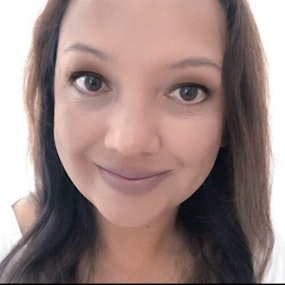
Joy Pereira
Joy Pereira is the Founder and Chief Creator at Joy Pereira Creative, creating live shows on digital platforms and producing conversations on her podcast Nerds of Joy interviewing entrepreneurs, creatives and industry experts.
Joy worked across a diverse range of productions over the last 23 years at the iconic Sydney Opera House and on other world events. Her theatrical and event experience as a Production Stage Manager, has seen her lead and deliver thousands of live events including performances for major artists, professional world orchestras, ideas and talk festivals, PR launches, speaker showcases and musicals.
Joy has a passion to help people be seen on camera - to produce their own creative works and offers podcast mentorship and live event producing. She is a mindful and slow living enthusiast.
Featured Episodes
Here are some great episodes to get started with


















